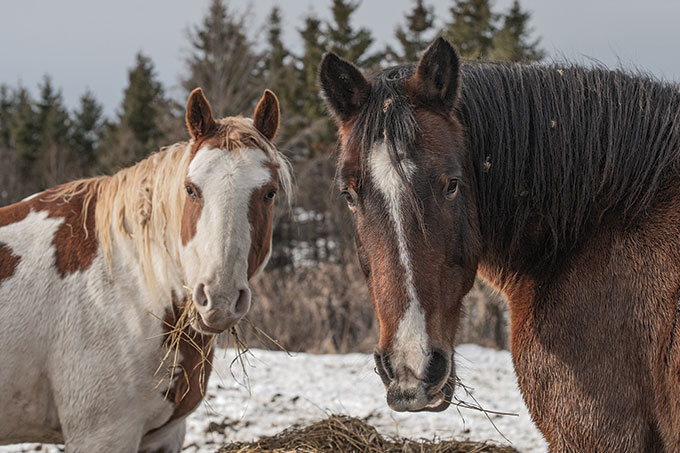

A New Approach to Deworming Your Horse
A horse with its digestive tract colonized by worms needs your help. Worms can cause severe health issues in a horse, including disease or death. For signs a horse is afflicted with worms, you may see changes in its attitude, appetite, weight and body condition, hair coat, habits, all possibly coexistent with the misery of an itchy rear end.
So, how do you help your horse? That depends. All horses need a deworming strategy that addresses their age and targets the specific worm(s) plaguing their gastrointestinal system. Vulnerable to the harshest consequences of worms, young and old horses need special consideration and may require specific, individualized deworming strategies.
In all cases, however, the first and best step in helping a horse of any age is to visit your vet. Your veterinarian will take account of the living conditions of your horse, including stocking density and routine surroundings (barn versus pasture), and apply the latest recommendations from experts in equine veterinary medicine.
Ideally, your vet conducts a fecal egg count each year to determine the level of parasite burden and identify which species are populating your horse’s gut. The fecal egg count also helps your vet determine the frequency of deworming needed for your horse, along with the best dewormers to use.
For the adult horse, the experts at the American Association of Equine Practitioners identify small strongyles and tapeworms as the most important parasites posing risk to the horse. Other types of parasites that could affect your horse include hookworms, flatworms, roundworms, and pinworms.
For your steed to be a happy, healthy horse, the parasites in its gut must go. The best remedy is an effective dewormer administered during optimum times of the year. Experts recommend a twice-a-year deworming program beginning at the start of a grazing season and finished soon after the end of a grazing season.
The grazing seasons in the United States vary by region, but generally the first deworming of the shorter northern region occurs in April or May and the second in October or November. In the longer southern region, the first deworming typically occurs in March or April and the second in November or December.

Deworm with what? Great question. Zoetis produces two products, Quest and Quest Plus, that not only control large and small strongyles, bots, and roundworms but are also the only Food and Drug Administration-approved dewormer to treat the encysted stage of the small strongyle in a single dose. Both products will suppress the production of small strongyle eggs for up to 84 days and, when administered prior to and after grazing season, are recognized by the American Association of Equine Practitioners as the effective deworming strategy for most adult horses.
Visit questhorse.com for more information.
About Zoetis
Zoetis (NYSE: ZTS) is the leading animal health company, dedicated to supporting its customers and their businesses. Building on more than 60 years of experience in animal health, Zoetis discovers, develops, manufactures and markets veterinary vaccines and medicines, complemented by diagnostic products, genetic tests, biodevices and a range of services. Zoetis serves veterinarians, livestock producers and people who raise and care for farm and companion animals with sales of its products in more than 100 countries. In 2017, the company generated annual revenue of $5.3 billion with approximately 9,000 employees. For more information, visit zoetisUS.com.
Related Articles

Horses
Weight Before Deworming Your Horse
Leave the weight-guessing game for carnivals. A weight tape helps ensure equine deworming effectiveness and prevents parasite resistance...
Read More

Horses
Monthly Equine Wellness Calendar
Every horse deserves quality care and welfare. Help ensure your horse’s health by working with the best resource – your veterinarian – and know his health and wellness needs...
Read More

Horses
Equine Probiotics, Prebiotics and Synbiotics
I think if you look at some of the literature in both the popular press and definitely in the scientific community, we have a lot of people who will tell you that probiotics are going to be the antibiotics in the 21st Century,...